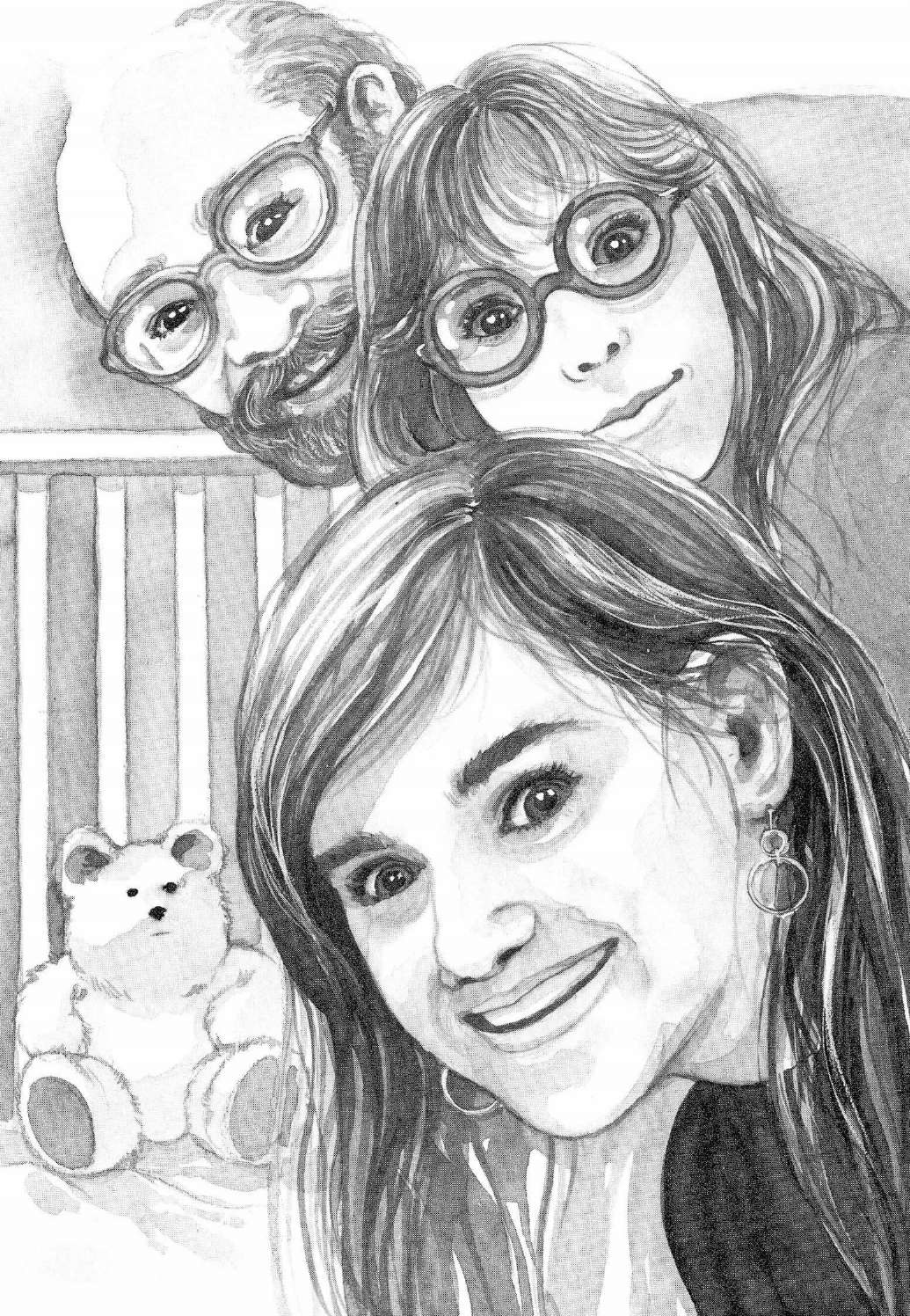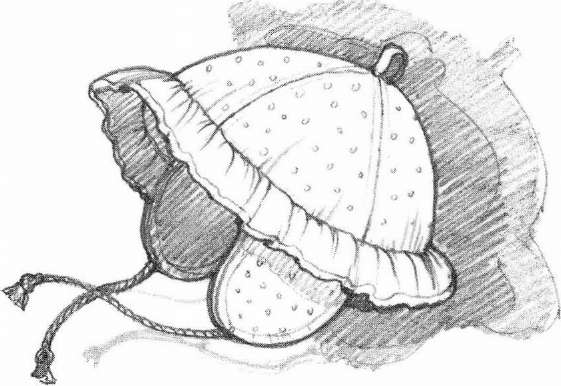All About Sam
Authors: Lois Lowry

Lois Lowry

Illustrated by Diane deGroat
Houghton Mifflin Company
Boston
Text copyright © 1988 by Lois Lowry
Illustrations copyright © 1988 by Houghton Mifflin Company
All rights reserved. For information about permission
to reproduce selections from this book, write to
Permissions, Houghton Mifflin Company, 215 Park Avenue
South, New York, New York 10003.
Library of Congress Cataloging-in-Publication Data
Lowry, Lois.
All about Sam / Lois Lowry : illustrated by Diane de Groat,
p. cm.
Summary: The adventures of Sam, Anastasia Krupnik's younger
brother, from his first day as a newborn through his mischievous
times as a toddler
ISBN 0-395-48662-9
[1. Family lifeâFiction.) I. deGroat, Diane, ill. II. Title.
PZ7.L9673A1 1988 88-13231
[Fic]âdcl9Â CIP
AC
Printed in the United States of America
QUM 20 19 18 17 16 15 14
For Jamie,
who is very much like Sam


It had certainly been an exciting morning for him, but a confusing one, too. There were bright lights, which he didn't like, and he was cold, and someone was messing around with his belly button, which hurt.
And he didn't know who he was yet.
"A fine healthy boy," he heard someone say. But that told him only
what
he was, not who.
He squinted and wiggled and stuck his tongue out, and they all laughed. He liked the sound of the laughter, so he did it again, and they all laughed some more.
Then they put some clothes on him, which made him nice and warm, though the clothes felt odd because he had never worn clothes before.
They passed him around from one person to another, which was a little scary because he was afraid they might drop him.
"Don't drop me," he wanted to say. But it came out sounding like "Waaaahhhh." Someone said "Shhhh" in a soft voice and patted his back gently.
"Who
am
I?" he wanted to ask, but that sounded like "Waaaahhhh" again, and she simply patted his back once more.
Finally they put him down in a little bed and dimmed the lights.
He opened his eyes wide now that the lights weren't so bright, but he couldn't see much: just the sides of the little bed, and high above him the blurred faces of people.
It was all too confusing and exhausting. He sighed, closed his eyes, and went to sleep.
When he woke again, he was in a different place. He was still in the little bed, but the bed had been moved; he knew because the walls were green instead of white. Now there were fewer peopleâfewer faces looking down at him. He could see these people a little better because his eyes weren't quite so new, so he blinked to focus more clearly and stared up at them.
There was a woman, and he could tell that he liked her a lot. She had happy eyes and a nice smile, and when she bent closer and touched his cheek with her finger, it was a gentle touch filled with love. He wiggled with happiness.
Then the woman's face went away, and a man leaned down. The man seemed to have his head on upside down; there was hair on the chin, but none on the head. Maybe that was the way men were supposed to look. The man had a nice smile, too.
Finally, a girl leaned over the bed. She had hair the same color as the man's chin hair, and she wore glass over her eyes, which were interesting to look at. But she wasn't smiling. She had a suspicious look.
The girl stared at him for a long time. He stared back. Finally she reached in and touched his hand. He had his hand curled up because he hadn't yet figured out anything interesting to do with it. But when the girl touched his hand, he grabbed her finger, which was just the perfect size for grabbing. He held on tight.
"Hey," the girl said, "I really like him!"
Of course you do, silly, he thought. He tried to say that, but only managed to spit and make a sound like "Phhhwww."
The man and the woman had happy smiles, which they aimed at the girl.
"Does he wet his diapers a whole lot?" the girl asked the man and the woman.
Yes, he thought, I do. As a matter of fact, I am wetting them right now, right at this very moment.
"He's only five hours old," the woman said. "So I haven't had time to conduct an exhaustive study. But in all honesty, Anastasia, I have to tell you that I think he will probably wet his diapers a whole lot."
You're right, he thought. I plan to. Because it feels good.
He yawned. They were talking to each other, but he didn't understand what they were saying, and he was a little bored. He was sleepy, too.
Then he heard the man say, "Have you picked out his name?"
And he heard the girl say, "Of
course
I've picked out his name."
So he tried hard to stay awake, even though he was sleepy, because he knew this was important. He blinked and yawned and wiggled and wet his diapers a little more, and waited. He waited while they murmured things to each other, which he couldn't hear. Then, one by one, they leaned over his bed again.
The girl with the pieces of glass over her eyes peered in at him, and now she was smiling. "Hi, Sam," she said.
The woman with the gentle voice looked down, and
she
said, "Hi, Sam."
The man with his head on upside down leaned close. In his deep, pleasant voice, he said, "Hi, Sam."
Oh, he thought happily. Now I understand. This is my family. My sister, my mother, my father.
And I am Sam, he thought and liked the sound of it.
Sam.
Sam.
SAM.
Sam was glad when they told him they were taking him home, because the word
home
sounded kind of nice, especially the way they said it to him in warm, happy voices.
But he hated the hat.
He didn't mind the dry diapersâby now, after three days, he was quite accustomed to getting dry diapers. He liked the chance to kick his legs in the air while they changed him, and he loved the soft feeling of the powder they sprinkled on his bottom.
He didn't mind the nightgown, though he hated it when they remembered to fold the mitten part over his hands. It was much better when they left the mitten turned back, because on each hand he had fingers and a thumb that he liked to suck when he was bored, or if they didn't feed him quite quickly enough when he was hungry.
But today, for the first time, they put a sweater on top of the nightgown, and the sweater was scratchy. I don't like this, he thought.
Then they put on the hat. And he
hated
the hat. It hurt under his chin where they tied it, and one of his ears was folded right in half inside the hat. He found the edge of the hat with one hand and tried to pull it off. They laughed and covered his hand with that terrible mitten.
I HATE THIS HAT, he yelled. But it sounded like "Waaahhhh," and they all said "Shhhhhh" and patted his back.
I HATE THIS HAT, he yelled again, and they jiggled him up and down and kissed his cheek.
"We're going home," they said.
NOT WITH THIS HAT ON, Sam yelled, but they didn't pay any attention to him, none at all. They wrapped a thick blanket around him, carried him through some doorways, down some halls, through some more doorways, and down some more halls.
It was about a hundred and fifty-three miles that they carried him, and for the entire distance he yelled, TAKE THIS HATEFUL HAT OFF ME!
But they didn't.
Then, suddenly, they went through one more doorway, and they were outside. It was cold and it was windy, and Sam had never felt anything like that before. He closed his eyes tight and snuggled down into the blanket as far as he could. The man held him very close, and he could feel the man's jacket against his cheek. Only his nose and his closed eyes were sticking out of the blanket, and he could feel the cold wind on those parts of him. But he was warm everyplace elseâeven his head.
Okay, he thought; you guys know best. I guess I
need
this hat.
He liked the car. Its sound was interesting, and he especially liked the feel of it as it moved. He thought he might even fall asleep. But he stayed awake because the girl, his sister, Anastasia, was holding him now, and she didn't hold him as firmly as his father did. She wasn't used to him yet. He was afraid she might drop him.
Hold me tighter, he said. A little firmer arm under the head and neck, please. But it sounded like spitting noises, and she smiled down at him and giggled.
"Look, Sam," she said. "Look out the window. There's a big oak tree. It doesn't have any leaves yet, but it will, soon."
He tried to look, but the oak tree was too far away and the car was moving too fast.
"Now look, Sam," Anastasia said. "That's a maple tree. We're at the corner of our street."
She pointed, and he cringed. Please put that arm back under my bottom, he thought. And she did.
His sister moved him back and forth in her arms gently, and she sang to him. "Rock-a-bye, baby," she sang, "in the treetop..."
Oak tree, he thought. Maple tree. Treetop.
Trees
must be something important.
When they got home, he knew he was right. The manâhis fatherâcarried him into the house while his sister and mother walked beside him.
"Sam," his sister was saying in an eager, excited voice, "we just have a small apartment. And there wasn't an extra bedroom for you. So we fixed one up in the pantry. We painted the walls blue, and we put your little crib in there, and we took the dishes out of the cupboards and put your clothes in there, and Mom made curtains with unicorns on them just for you. I bet you're the only baby in Cambridge who gets to sleep in a pantry!"
Pan tree,
thought Sam. Rock-a-bye, baby, in the pan tree. Okay. Whatever it means, I'm all for it, because she said "sleep." And I am very, very sleepy.
They laid him down in the crib, and the woman changed his diapers. She used the same soft powder that he loved. Then she took off his sweater and,
finally
âabout
time
âshe took off his hat.
He took a quick look around the pan tree, wiggled down beneath the blanket they put over him, yawned, found a finger to suck on, and closed his eyes.
